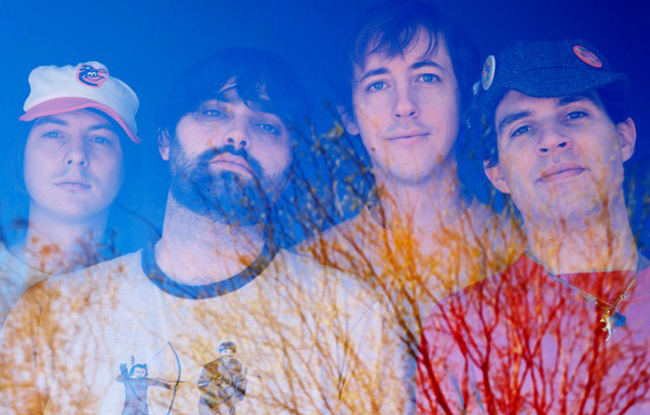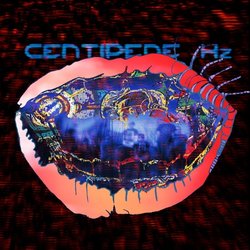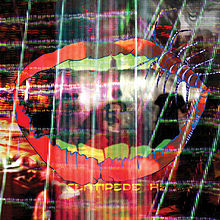Animal Collective’s New Album, Centipede Hz

Animal Collective is an unusually polarizing group. Most likely due to the perception of the group as being naively pretentious once the casual music listener is met with an onslaught of extended developments, unapologetic chants and repetitions, and hiccups from a digitized jungle before discovering the band’s furry pseudonyms.
That and then there’s AC’s popular association with the droll hipster trend that can’t help but make itself an easy target of sophomoric pretentiousness. So AC seems to get the short-end of the stick sometimes because their original base of fans have fractured over “selling out” once their music became more accessible while their new, much larger market exposure has created a lot of mistrust surrounding their avant-garde nature.
(Be sure to scroll down to hear their new album, Centipede Hz)
I personally like to think of AC in the context of a special narrative – a group that for years experimented, never quite getting it right, and then finally hitting that holy grail of music that’s both well-structured and original, giving hope to all artists who haven’t made it to that haven yet, that if they only toil a little longer with their artistic exploration, they’ll finally “find it”. Whether that narrative is wholly or partially true to the members of AC is debatable, I don’t think I’m not alone in this fantasization.
A couple weeks ago (September 4th), Animal Collective released their new album Centipede Hz. Just to give us all some background to the album from its Wikipedia entry:
“In November 2010, Deakin rejoined Animal Collective, after sitting out on the recording and touring of the band’s eighth studio album, Merriweather Post Pavilion (2009). With the band’s fanbase significantly expanded, the four members of Animal Collective moved back to their hometown of Baltimore, Maryland, in early 2011, to begin writing their ninth studio album…
In an interview with Pitchfork Media, Avey Tare called Centipede Hz “more grounded in one location” and less ambient than the group’s previous album.The group also wanted the album to have a “live-band feel” to it. In turn, live instruments were used such as a sit-down drum kit and live keyboards…”
If Merriweather Post Pavilion didn’t define the electronic-coated era of forward-looking popular music that came to the forefront in the latter half of the 2000s, then it certainly stood above it. So, as usual with reaching a new apex, it’s a tough act to follow, especially when everyone expects you to be fresh and original on top of it.
The cover art for Centipede Hz certainly stands out against their other garishly colored covers, this one being harsher and darker:


Listen to the FULL album for FREE right here!:
Some track-by-track notes on Centipede Hz:
Moonjock – A likeable, steady start to the album that sounds like it could fit among Strawberry Jam‘s more energetic tracks, but with more electronic accompaniment and samples.
Today’s Supernatural – That merry-go-round feeling from the rhythmic structures on Merriweather Post Pavilion reprises itself here, but with a darker tone. This one’s perhaps the most conducive to another indie band covering it without there being too much lost in translation.
Rosie Oh – Very interesting track and especially rewarding if you’re paying attention to the eloquent 60’s British-pop patterns of the vocalists – easy to imagine Paul McCartney singing along. I don’t remember hearing something quite like this in AC’s catalog.
Applesauce – Another sweet-tasting, good feeling track that’s very much self-described by its own lyrics “so fluid, so smooth against the bone”. The three-part segment from 1:30 to 2:20 is a highlight of the album – a quintessence of AC’s best abilities to seamlessly toss the listener from one fresh construction to the next and back again.
Wide-Eyed – Prominent electronic background rhythms and accompaniment. Deakin provides vocals, which adds to the shift that this piece in the middle of the album brings, although it’s a bit of a shame it wasn’t slowed down to give the listener more of a rest from the persistent pace and energy.
Father Time – A very catchy chorus but also gives the listener a chance to cool off some from any previous feverishness. I can say with some confidence this one will get some airtime, at least on college radio.
New Town Burnout – Another slowing down of the pace. I’m sure some listeners are bound to make comparisons between this track’s echoing vocals and that of Gotye’s big hit Somebody That I Used to Know…not to say that this track is especially derivative of other sounds (like Sting in Gotye’s case) out there, as it’s still quite an original piece.
Monkey Riches -If there were a track on this album to exemplify AC’s latest movement into both new and solid territory, a statement of their direction, this one would be my pick for that title. A single electronica phrase (like a snippet out of Thom Yorke’s The Eraser) is sampled throughout while Avey Tare drones, then increasingly compacts his lyrics in between the rhythms, channeling someone like Stevie Wonder and then Michael Jackson at “I don’t wanna knock you down”. Still, the sounds of frog gurgles and Tare’s signature end-slants on his phrases are all still there, making it very much a piece by AC, but it’s a satisfying piece for those seeking out their new directions.
Mercury Man -I’d rank this one at the bottom. I’m tempted to say it harkens back to their earlier, more “abrasive” days, but I still think it sounds like in belongs among the others on Centipede Hz, so it isn’t exactly moving backwards.
Pulleys – If it wasn’t for the clapping rhythms and occasional shifts in dynamics and tempo, I would say AC is responsible for a weak track that gets caught up in a repetitive chant. Granted, the repetitive and primitive chanting aspect is part of their sound and who they are as a group but they’ve done better (and worse) within similar compositions.
Amanita – Another track (this one name after a genus of toxic mushroom) that seems to be letting its foot down onto new ground. Although it does so through an odd mixture of faux synthesized Chinese music and adult contemporary-tinged musical phrases sung from 3:13 to 3:48. The outro section is a joyous and gratuitous sendoff that more conservatively caps things off.
Overall, this album can only be disappointing if you have your expectations set at either “better than MPP” or “unattainably original”. I recommend you have fun with it, after all, these guys have names like Panda Bear and Geologist. 😉
Posted by Jordan Inman (volunteer contributor)
